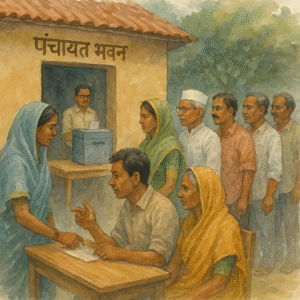Simplified Explanation of the Judgment
In a recent decision, the Patna High Court dismissed a writ petition filed by four aggrieved contractors challenging the award of two specific works (Serial No. 1 and 8) under a government tender to a rival bidder. The dispute revolved around alleged irregularities in the rival bidder’s technical qualifications and documentation.
The petitioners were all registered contractors under the Bihar Contract Registration Rules, 2007, and had applied under a tender floated by the Rural Works Department dated 13.12.2023. They raised objections regarding the award of the contract to the 11th respondent (a private construction firm), alleging that the bidder:
- Failed to upload the mandatory affidavit declaring non-ineligibility (as per Clause 20 of the NIT),
- Was awarded the contract without consideration of objections raised under Clause 30,
- Submitted documents for expired vehicles and sold equipment,
- Relied on affidavits on judicial stamp paper, allegedly invalid under the Stamp Act.
The High Court examined these claims in depth.
On the affidavit issue, the Court held that even if judicial stamp paper was used, such affidavits are valid once impounded and properly stamped under the Stamp Act. Therefore, this was not a fatal error.
Regarding the equipment requirements (as per Clause 4.4B(b)(i) of the Model Bidding Document), the Court found that the rival bidder had supplied valid documents for the minimum required number of tipper trucks and two out of three tractors. For the third tractor, while the fitness certificate was not initially submitted, tax was paid for an extended period—indicating that the fitness was likely renewed. Moreover, the bidder had submitted an affidavit committing to arrange the remaining equipment within 30 days of issuance of LOA, as allowed by the tender conditions.
On the objection under Clause 30 (relating to filing complaints within five days of technical bid evaluation), the Court noted that the petitioners had filed their objection only after the financial bid was opened. Thus, their objection was time-barred and procedurally weak.
Importantly, the Court reiterated that minor deviations or curable defects should not result in cancellation of L1 (lowest bidder) if such deviations are non-essential. It emphasized that disqualifying L1 in such circumstances would cause financial loss and delay to public works.
The Court distinguished this case from earlier judgments such as M/s Ashok Construction and Sona Engicon Pvt. Ltd., noting that in those cases, mandatory documents were entirely missing, while here, sufficient compliance was shown.
Accordingly, the writ petition was dismissed.
Significance or Implication of the Judgment
This ruling clarifies how courts evaluate tender-related disputes, especially where procedural lapses or minor document irregularities are cited:
- It upholds the principle that essential eligibility criteria must be met, but allows flexibility for curable and non-substantial deviations.
- The judgment discourages frivolous litigation aimed at disqualifying successful bidders on hyper-technical grounds.
- It reaffirms that cancellation of L1 bids should only occur in clear cases of non-compliance to avoid financial loss and delay to public infrastructure works.
- Government authorities are reminded to act within the tender terms but not overly rigidly to the detriment of project timelines and cost-efficiency.
For contractors, the decision underscores the importance of adhering to timelines for objections and understanding the weight of essential versus non-essential tender conditions.
Legal Issue(s) Decided and the Court’s Decision with Reasoning
- Was the L1 bidder ineligible due to expired vehicle fitness certificates?
- No. Valid certificates for trucks were submitted, and tax payment suggested valid fitness for tractors.
- Did submission of affidavits on judicial stamp paper invalidate the bid?
- No. Such affidavits are acceptable if impounded and properly stamped under the Stamp Act.
- Should the award be canceled due to technical objections post financial bid opening?
- No. Objections under Clause 30 must be raised within five days of technical evaluation.
- Was there a departure from essential tender conditions?
- No. The core eligibility was satisfied, and the rest were curable deviations.
- Should earlier judgments like Ashok Construction and Sona Engicon apply?
- No. In those cases, essential documents were missing. Here, compliance was substantially shown.
Judgments Referred by Parties
- Ramana Dayaram Shetty v. International Airport Authority, (1979) 3 SCC 489
- M/s Ashok Construction v. State of Bihar, CWJC No. 4139 of 2024
- Sona Engicon Pvt. Ltd. v. State of Bihar, CWJC No. 13539 of 2024
Judgments Relied Upon or Cited by Court
- Poddar Steel Corporation v. Ganesh Engineering Works, (1991) 3 SCC 273
- BSN Joshi & Sons Ltd. v. Nair Coal Services Ltd., (2006) 11 SCC 548
Case Title
M/s Jay Mata Di Enterprises & Ors. v. The State of Bihar & Ors.
Case Number
CWJC No. 12254 of 2024
Coram and Names of Judges
Hon’ble the Chief Justice K. Vinod Chandran and Hon’ble Mr. Justice Partha Sarthy
Names of Advocates and Who They Appeared For
- For the Petitioners: Mr. Ashish Giri, Mr. Sarveshwar Tiwary, Ms. Pragati Patra, Mr. Sumit Kumar Jha, Ms. Riya Giri
- For the Respondents: Mr. P. K. Shahi (Advocate General), Mr. Ramakant Sharma (Senior Advocate), Mr. Vikas Kumar, Mr. Sourav Suwan
Link to Judgment
If you found this explanation helpful and wish to stay informed about how legal developments may affect your rights in Bihar, you may consider following Samvida Law Associates for more updates.








